| Post | Image | Name | Party | Period |
|---|
| Prime Minister |  | Viktor Chernomyrdin | | Our Home – Russia | 10 August 1996 – 23 March 1998 |
| Deputy Prime Ministers |
|---|
| First Deputy Prime Minister | | Alexei Bolshakov | | Independent | 14 August 1996 – 17 March 1997 |
| First Deputy Prime Minister | | Viktor Ilyushin | | Independent | 14 August 1996 – 17 March 1997 |
| First Deputy Prime Minister |  | Vladimir Potanin | | Independent | 14 August 1996 – 17 March 1997 |
| First Deputy Prime Minister |  | Anatoly Chubais | | Democratic Choice of Russia | 17 March 1997 – 23 March 1998 |
| First Deputy Prime Minister |  | Boris Nemtsov | | Independent | 17 March 1997 – 23 March 1998 |
| Deputy Prime Minister – Chief of Staff of the Government | 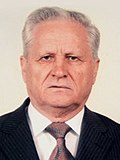 | Vladimir Babichev | | Our Home – Russia | 10 August 1996 – 17 March 1997 |
| Deputy Prime Minister | | Oleg Davydov | | | 10 August 1996 – 17 March 1997 |
| Deputy Prime Minister |  | Vitaly Ignatenko | | | 10 August 1996 – 17 March 1997 |
| Deputy Prime Minister | | Alexander Zaveryukha | | | 10 August 1996 – 17 March 1997 |
| Deputy Prime Minister | | Oleg Lobov | | | 14 August 1996 – 17 March 1997 |
| Deputy Prime Minister |  | Aleksandr Livshits | | | 14 August 1996 – 17 March 1997 |
| Deputy Prime Minister | | Valery Serov | | | 14 August 1996 – 28 February 1998 |
| Deputy Prime Minister |  | Vladimir Fortov | | Our Home – Russia | 17 August 1996 – 17 March 1997 |
| Deputy Prime Minister |  | Anatoly Kulikov | | | 4 February 1997 – 23 March 1998 |
| Deputy Prime Minister |  | Oleg Sysuyev | | Our Home – Russia | 17 March 1997 – 13 March 1998 |
| Deputy Prime Minister | | Alfred Koch | | | 17 March 1997 – 13 August 1997 |
| Deputy Prime Minister |  | Yakov Urinson | | | 17 March 1997 – 23 March 1998 |
| Deputy Prime Minister | | Vladimir Bulgak | | Our Home – Russia | 17 March 1997 – 23 March 1998 |
| Deputy Prime Minister | | Viktor Khlystun | | | 19 May 1997 – 23 March 1998 |
| Deputy Prime Minister | 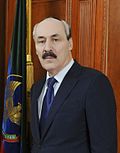 | Ramazan Abdulatipov | | Party of Russian Unity and Accord | 1 August 1997 – 23 March 1998 |
| Deputy Prime Minister | | Maxim Boycko | | | 13 August 1997 – 15 November 1997 |
| Deputy Prime Minister |  | Farit Gazizullin | | | 20 December 1997 – 23 March 1998 |
| Deputy Prime Minister |  | Ivan Rybkin | | Socialist Party of Russia | 2 March 1998 – 23 March 1998 |
| Federal Ministers |
|---|
| Minister of Agriculture | | Viktor Khlystun | | | 10 August 1996 – 23 March 1998 |
| Minister of Atomic Energy | | Viktor Mikhaylov | | | 14 August 1996 – 2 March 1998 |
 | Yevgeny Adamov | | | 2 March 1998 – 23 March 1998 |
| Minister of Communications | | Vladimir Bulgak | | Our Home – Russia | 14 August 1996 – 17 March 1997 |
| Minister for Cooperation with Member States of the CIS | 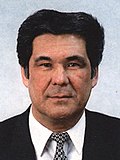 | Aman Tuleyev | | Independent | 22 August 1996 – 1 July 1997 |
| Anatoly Adamishin | | | 28 August 1997 – 23 March 1998 |
| Minister of Culture | | Yevgeny Sidorov | | Our Home – Russia | 22 August 1996 – 28 August 1997 |
 | Natalya Dementyeva | | | 28 August 1997 – 23 March 1998 |
| Minister of Defence |  | Igor Rodionov | | | 10 August 1996 – 22 May 1997 |
 | Igor Sergeyev | | | 22 May 1997 – 23 March 1998 |
| Minister of Defence Industry |  | Zinovy Pak | | | 14 August 1996 – 17 March 1997 |
| Minister of Economy |  | Yevgeny Yasin | | | 10 August 1996 – 17 March 1997 |
 | Yakov Urinson | | | 17 March 1997 – 23 March 1998 |
| Ministry of General and Professional Education | | Vladimir Kinelyov | | Our Home – Russia | 14 August 1996 – 28 February 1998 |
| Alexander Tikhonov | | | 2 March 1998 – 23 March 1998 |
| Minister of Emergency Situations | 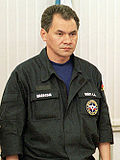 | Sergey Shoygu | | Our Home – Russia | 10 August 1996 – 23 March 1998 |
| Minister for Ethnicities and Federal Relations |  | Vyacheslav Mikhailov | | | 14 August 1996 – 23 March 1998 |
| Minister of Finance |  | Aleksandr Livshits | | Independent | 15 August 1996 – 17 March 1997 |
 | Anatoly Chubais | | Democratic Choice of Russia | 17 March 1997 – 20 November 1997 |
 | Mikhail Zadornov | | Independent | 20 November 1997 – 23 March 1998 |
| Minister of Foreign Affairs |  | Yevgeny Primakov | | Independent | 10 August 1996 – 23 March 1998 |
| Minister of Foreign Economic Relations | | Oleg Davydov | | | 14 August 1996 – 1 April 1997 |
| Minister of Foreign Economic Relations and Trade |  | Mikhail Fradkov | | | 16 April 1997 – 23 March 1998 |
| Minister of Fuel and Energy | | Pyotr Rodionov | | | 22 August 1996 – 9 April 1997 |
 | Boris Nemtsov | | Independent | 24 April 1997 – 20 November 1997 |
 | Sergey Kiriyenko | | Independent | 20 November 1997 – 23 March 1998 |
| Minister of Health and Social Development | | Tatyana Dmitrieva | | Our Home – Russia | 22 August 1996 – 23 March 1998 |
| Minister of Industry | | Yuri Bespalov | | | 10 August 1996 – 17 March 1997 |
| Minister of Internal Affairs |  | Anatoly Kulikov | | Independent | 10 August 1996 – 23 March 1998 |
| Minister of Justice |  | Valentin Kovalyov | | | 10 August 1996 – 2 July 1997 |
 | Sergey Stepashin | | | 2 July 1997 – 23 March 1998 |
| Minister of Labour and Social Development |  | Gennady Melikyan | | Our Home – Russia | 14 August 1996 – 14 April 1997 |
 | Oleg Sysuyev | | Our Home – Russia | 14 April 1997 – 23 March 1998 |
| Minister of Natural Resources | 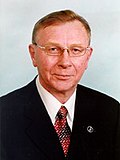 | Viktor Orlov | | | 22 August 1996 – 23 March 1998 |
| Minister of Railways | | Anatoly Zaytsev | | | 22 August 1996 – 14 April 1997 |
 | Nikolay Aksyonenko | | | 14 April 1997 – 23 March 1998 |
| Minister of Scence and Technology |  | Vladimir Fortov | | Our Home – Russia | 17 March 1997 – 23 March 1998 |
| Minister of State Property | | Maxim Boycko | | | 30 September 1997 – 15 November 1997 |
 | Farit Gazizullin | | | 20 December 1997 – 23 March 1998 |
| Minister of Transport | | Nikolai Tsakh | | | 10 August 1996 – 28 February 1998 |
 | Sergey Frank | | | 28 February 1998 – 23 March 1998 |
| Chief of Staff of the Government – Minister of the Russian Federation |  | Vladimir Babichev | | Our Home – Russia | 17 March 1997 – 23 March 1998 |


































